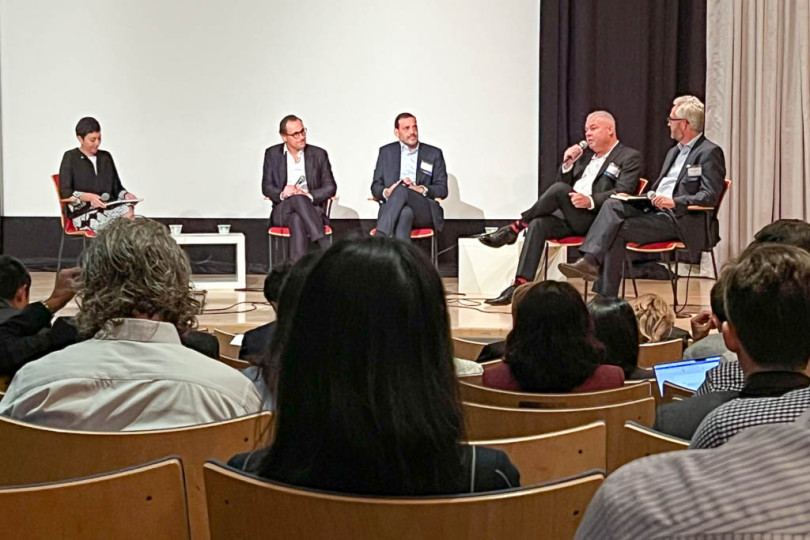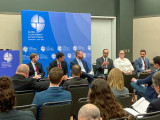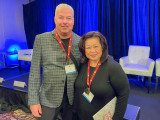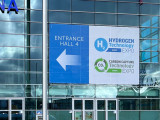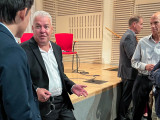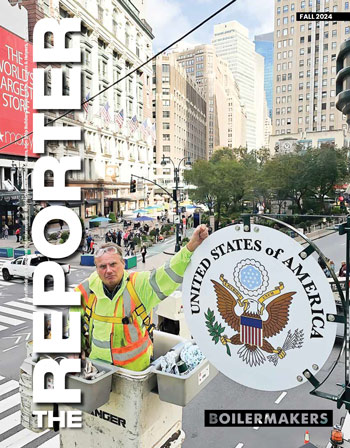Cory Channon, International Director of Climate Change Policy Solutions, gives labor’s perspective on CCUS and an “all of the above approach” during a New York Climate Week event.
View Photo Gallery (6 photos)
For over a decade, the Boilermakers union has taken the lead in learning about and promoting critical technologies, such as carbon capture, use and storage, as part of an “all of the above” approach to solving climate change and preserving or creating jobs.
Years of advocacy is beginning to pay off, and more and more domestic and global discussions, coupled with opportunities such as the Inflation Reduction Act, indicate an appetite to implement CCUS and other technologies into the mix of climate change solutions. Over the past few months, the Boilermakers union has participated in several key climate and energy events to ensure the voice of workers continue to be heard and that sensible and real solutions prevail.
New York Climate Week, September 2022
New York’s famed Climate Week, which is part of the United Nations’ General Assembly events, is one of the premiere world events that brings a variety of corporations, government agencies, nonprofits, climate experts and leaders together from around the world to discuss new research, learn about new technologies and seek climate change solutions.
The week is composed of myriad “side” events, which, in 2022, included an event hosted by the Global CCS Institute. Boilermakers International Director of Climate Change Policy Solutions Cory Channon served on a panel discussion on the future of carbon capture technologies. Channon offered industry knowledge and insight from labor’s perspective.
As an early advocate of CCUS, the Boilermakers union has been a leader in educating the public and elected officials about the technology as a critical component in an “all of the above” approach to energy production and climate change solutions. Channon said the narrative is finally beginning to shift as people are understanding and getting on board with CCUS.
“It’s all about educating everyone about CCUS and diffusing the misrepresentation of people globally who are criticizing the technology,” he said. “Knowledge sharing is critical, explaining to people that the technology works and is proven. The policymakers in government simply don’t know. When you ask where the power comes from, they think it’s from the switch on the wall.”
Channon said there is still a long way to go and much hard work ahead in convincing people, and ultimately, corporations and elected officials to adopt CCUS.
Panel moderator Guloren Turan, who is General Manager-Advocacy and Communications for the Global Institute, concurred.
“It’s hard work, but we have no other choice. We’re going to need everything at our disposal as quickly as possible,” she said. “While CCUS isn’t the only solution, there is a beautiful interplay between all the solutions. We need [CCUS]. It’s not scary, and it’s working.”
Global Clean Energy Action Forum, Pittsburgh, September 2022
Held concurrent with New York Climate Week, the Global Clean Energy Action Forum was hosted for the first time in the United States. The event convened the 13th Clean Energy Ministerial and seventh Mission Innovation ministerial and was supported by the U.S. Department of Energy and Carnegie Mellon University. The three-day event joined government, international organizations, the private sector, academia, innovators, civil society, researchers and policymakers for high-level plenary sessions and roundtable discussions on energy, science and technology.
Martin Williams, who is the Boilermakers National Coordinator of State Legislative Affairs, M.O.R.E. Work Investment Fund, served on a panel to represent Boilermakers’ and labors’ perspective on energy and environmental solutions. He focused in on job opportunities—particularly in Pennsylvania, the event’s host state.
“Pennsylvania and the Appalachian region is an area that has tremendous potential for development of hydrogen and CCUS hubs,” he said. “If the right decisions can be made to steer that, we’re going to see a lot of Boilermaker jobs in the future.”
He added that it’s important for Boilermakers and allies to organize advocation of CCUS and other new technologies—and to keep the momentum going.
“For a long time, the discussion has been driven by industries and non-government organizations, and that ends up translating to policy,” Williams said. “Government sets policies based on input. If we’re not there—Boilermakers, the building trades and all our allies—we’re not adding that labor perspective and how these technologies and policies can help working people. We need to take advantage of all opportunities to reinforce this message so it’s not forgotten.”
Reuters Hydrogen North America 2022, Houston, Texas, October
A small group of Boilermakers and staff explored the 2022 Hydrogen North America summit hosted by Reuters to learn about the latest opportunities and thoughts regarding hydrogen in a clean energy future. Many of the United States’ leading energy producers attended the event.
“Hydrogen is a brave new world for many of us, and the opportunities before us are phenomenal,” said Bill Newsom, President and CEO of Mistubishi Power, during a plenary session. He described the need for a “new ecosystem” of partnerships and emphasized the importance of developing new partnerships and all entities working together in order to achieve net-zero emissions by 2050.
Andy Marsh, Plug Power CEO, said that hydrogen has changed over the past four to five years and the thirst for technology advancement and implementation has increased.
“Today capital is available. It really started with Paris,” he said. “Countries around the world made a commitment to change their carbon footprint. There’s now a realization it can’t be done with just batteries.”
Carbon Capture and Hydrogen Technology Expos, Bremen, Germany, October
The Carbon Capture and Hydrogen Technology Expos are concurrent events offering plenary sessions and five topical tracks: CCUS; low-carbon hydrogen production; system integration and infrastructure; hydrogen fuel cell design, development and manufacturing; and e-fuels and hydrogen propulsion. Now in their second year, the tandem events surged in 2022, tripling in attendance and in exhibitor presence.
“It was evident this year in the exhibitors and in the session speakers that the narrative is moving away from ‘why should we adopt these technologies,’ to ‘how do we best implement,’ said Channon, who participated in the events in 2021 and 2022. “It was interesting to see the number of global exhibitors showcasing the supply chain side of implementation—the many technologies and components needed to bring CCUS and hydrogen to life.
“This was a clear punctuation: The message has been received. It’s time to stop debating the merits of CCUS, hydrogen and other new technologies. We’re getting started saving our planet, our jobs and our futures.”
